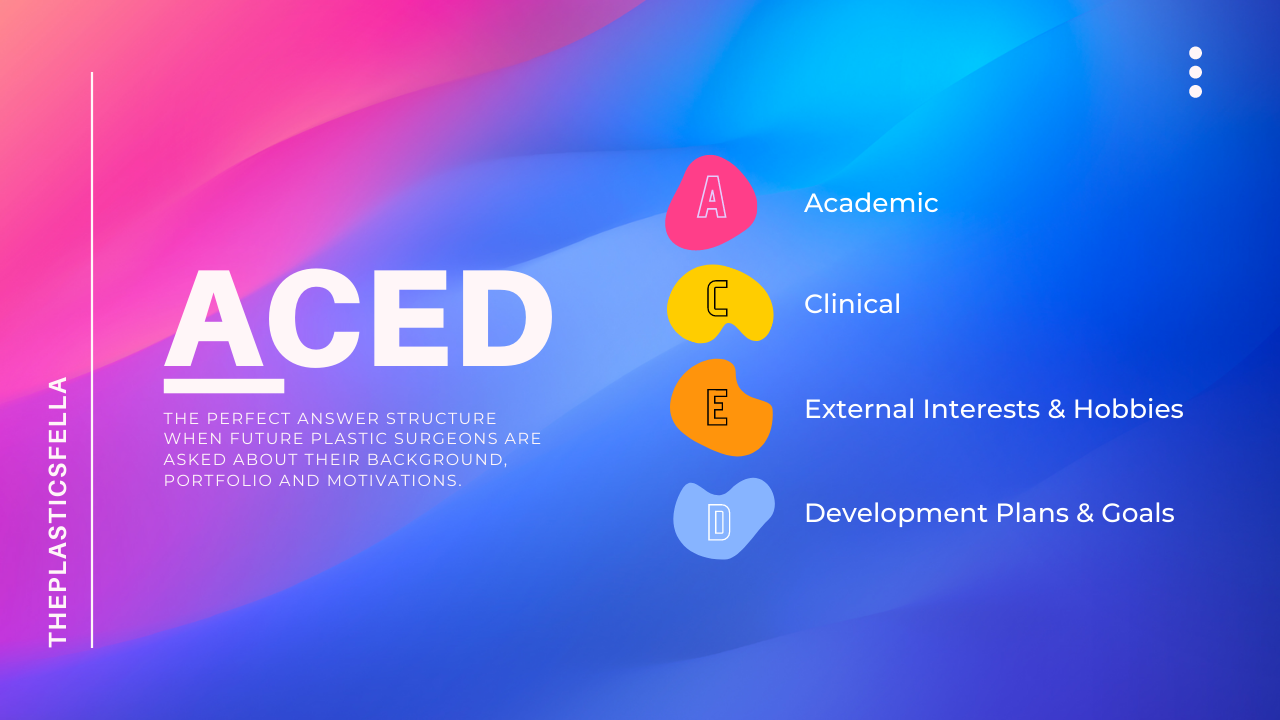In this Week's Edition
1. ✍️ Letter from P'Fella - the cost of interviews.
2. 📝 Article of the Week - 2 new publications.
3. 🧐 Weekly Quiz Competition - 100+ leaderboard
4. 🎭 Upcoming Events - 13 webinars, conferences
5. 🐣 Tweet of the Week - memes, images, journals.
6. 🚀 New Features - interview answer templates
1. ✍️ Letter from P'Fella - the cost of interviews.
2. 📝 Article of the Week - 2 new publications.
3. 🧐 Weekly Quiz Competition - 100+ leaderboard
4. 🎭 Upcoming Events - 13 webinars, conferences
5. 🐣 Tweet of the Week - memes, images, journals.
6. 🚀 New Features - interview answer templates
✍️
A Letter from P'Fella
The cost of Plastic Surgery Interviews 🤢
Perhaps, one of the most daunting periods in a plastic surgeon's training program is the interview. The interview with the potential to essentially decide the rest of your career.
These emotions are compounded by the cost of the interview season. Everyone is well aware of the submission costs, travel costs, outfit costs. But what really annoys P'Fella is the cost of "interview prep courses". They can range from $200 to $800+. In return, you get a 2-day course centered on past questions and techniques. Whilst some may be useful in the short-term (you forget everything you learned after a few days), the majority are unfortunately preying on the trainees' fear and anxiety.
To help reduce these costs, P'Fella has developed a not-for-profit interview companion. It's a complete package of past questions, model answers, answer templates, and of course, live practice with mock interviews.
If you have an upcoming interview, you should check it out below.
These emotions are compounded by the cost of the interview season. Everyone is well aware of the submission costs, travel costs, outfit costs. But what really annoys P'Fella is the cost of "interview prep courses". They can range from $200 to $800+. In return, you get a 2-day course centered on past questions and techniques. Whilst some may be useful in the short-term (you forget everything you learned after a few days), the majority are unfortunately preying on the trainees' fear and anxiety.
To help reduce these costs, P'Fella has developed a not-for-profit interview companion. It's a complete package of past questions, model answers, answer templates, and of course, live practice with mock interviews.
If you have an upcoming interview, you should check it out below.
📝
Articles of the Week
💉 Collagenase vs Needle Fasciotomy
Five-Year Results of a Randomized, Controlled Trial of Collagenase Treatment Compared With Needle Fasciotomy for Dupuytren Contracture
Martin Byström MD et al, Journal of Hand Surgery, Jan 2022.
• Design: Prospective, randomized, controlled trial
• Patients: >20° contracture in 1 MCPJ.
• Outcome: contracture, recurrence, presence of cords, and PROMs
• Results: 156 patients followed up over 5 years
• Conclusion: no differences in ROM, contracture, or PROM
Five-Year Results of a Randomized, Controlled Trial of Collagenase Treatment Compared With Needle Fasciotomy for Dupuytren Contracture
Martin Byström MD et al, Journal of Hand Surgery, Jan 2022.
• Design: Prospective, randomized, controlled trial
• Patients: >20° contracture in 1 MCPJ.
• Outcome: contracture, recurrence, presence of cords, and PROMs
• Results: 156 patients followed up over 5 years
• Conclusion: no differences in ROM, contracture, or PROM
🪡 A better way to tie your suture knot
To Tie or Not to Knot: Half Instrument Tie Outdoes Traditional Knot
Akiki, Ronald K. M.D et al, PRS Journal, Jan 2022.
The half instrument tie has many advantages to the surgeon’s knot.
1. Biomechanical advantage: by avoiding an additional same-direction throw and thus consequently a decrease in knot advancement.
2. Efficiency: it is relatively simple and fast, and exploits the tension created using a pinching maneuver.
3. Tension: means by which to hold the tension between the first and second throws, and thus solves the problem of potential unraveling when performing single-throw square knots.
Here is a video on the technique
To Tie or Not to Knot: Half Instrument Tie Outdoes Traditional Knot
Akiki, Ronald K. M.D et al, PRS Journal, Jan 2022.
The half instrument tie has many advantages to the surgeon’s knot.
1. Biomechanical advantage: by avoiding an additional same-direction throw and thus consequently a decrease in knot advancement.
2. Efficiency: it is relatively simple and fast, and exploits the tension created using a pinching maneuver.
3. Tension: means by which to hold the tension between the first and second throws, and thus solves the problem of potential unraveling when performing single-throw square knots.
Here is a video on the technique
🤓
Weekly Quiz Competition
Fellow plastics geeks, here is this week's question.
The leaderboard is hotting up. 125+ of your peers on it. Every so often, the leader will be getting a pretty sweet prize.

🎭
Upcoming Events
13 Webinars, Conferences, and Courses
- Journal Hand Surgery Journal Club - Virtual, Jan 26th 2022.
- ICCPCA Webinar - Orthognathic Surgery - January 29th
- BSSH Arthritis Workshop - Manchester, Feb 2022.
- ASPS In-Service Exam - Virtual, March 2022.
- ASPS Spring Meeting - Virtual, March 2022.
- AAPS Centennial Meeting - San Diego, April 2022.
- RACS 90th Annual Scientific Conference - Brisbane, May 2022.
- Australian ASPS Congress - Goldcoast, June 2022
- Aesthetics In-Service Exam - Virtual, June 2022.
- ISAPS World Congress - Istanbul, July 2022
- ICCPCA Cleft Congress - Edinburgh, July 2022
- ASSH Annual Meeting - Boston, September 2022.
- Plastic Surgery, The Meeting - Boston, October 2022.
🐣
Tweets of the Week
Nature does open access pic.twitter.com/j6kL1G3ZRX
— Dr. Glaucomflecken (@DGlaucomflecken) January 22, 2022
Put👏 Glitter👏 In👏 Dermabond👏
— Resus Cric 🥣Souperstar🍲🫕 (@RozehnalMd) January 21, 2022
Reviewer 2 pic.twitter.com/npQwO2Vluy
— Adi (@IDdocAdi) January 20, 2022
🚀
Testing New Features
Must-have interview answer templates
There is no bigger fear than going "blank" in an interview. No matter how much you prepare, there may be 1 or 2 questions that might catch you by surprise. To avoid this, P'Fella has created answer templates specific to the Plastic Surgery Interview.
Here is an example of one 👇



